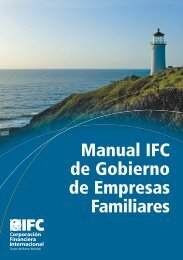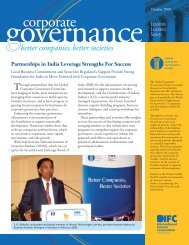Track Record: Lessons from IFC's Corporate Governance Experience
Track Record: Lessons from IFC's Corporate Governance Experience
Track Record: Lessons from IFC's Corporate Governance Experience
You also want an ePaper? Increase the reach of your titles
YUMPU automatically turns print PDFs into web optimized ePapers that Google loves.
Table of ContentsIntroductionA Brief History of IFC’s <strong>Corporate</strong><strong>Governance</strong> Advisory Services .......................................................................................................................... 1Pre-project Planning and DesignReducing Survey Implementation Delays: <strong>Experience</strong>s of a <strong>Corporate</strong><strong>Governance</strong> Practices Survey in Kazakhstan by Karl Bach .................................................................................. 4Project DesignOne <strong>from</strong> Column A; Two <strong>from</strong> Column B: Using a Flexible Project Modelfor <strong>Corporate</strong> <strong>Governance</strong> Advisory Services Projects by Roman Zyla .............................................................. 10Structuring <strong>Corporate</strong> <strong>Governance</strong> Projectsby Sebastian Molineus ...................................................................................................................................... 14Project StaffingCan We Talk? Staffing Considerations in Project Designby Charles Canfield and Roman Zyla ................................................................................................................ 20In-House, Outsourcing, or a New Hybrid Approach to Advisory Services:The <strong>Corporate</strong> <strong>Governance</strong> Project in the Balkansby Merima Zupcevic Buzadzic, Kiril Nejkov, Katarina Djulic, and Sonila Bicaku ............................................... 24Doing More with Less: Creating Innovative <strong>Corporate</strong> <strong>Governance</strong>Products when Resources are Scarce by Rasmina Gurbatova and Anar Aliyev .................................................... 28PricingPay Less, Get More: A Sustainable Business Approach to Capacity-Building Servicesby Juan Carlos Fernandez ................................................................................................................................ 34Money Can’t Buy You Love…But It Can Buy You Our Services: <strong>Experience</strong>s inCharging for <strong>Corporate</strong> <strong>Governance</strong> by Motria Onyschuk-Morozov and Patricia Maruschak ............................. 38Working with Companies and BanksMaking the Business Case: Direct Engagement with Companies and Banksto Improve their <strong>Governance</strong> Practices by Roman Zyla .................................................................................... 46<strong>Lessons</strong> <strong>from</strong> IFC’s <strong>Corporate</strong> <strong>Governance</strong> <strong>Experience</strong>
Public Awareness and Media TrainingEarning Astana Yellow Jerseys in a <strong>Corporate</strong> <strong>Governance</strong> Race: EngagingExternal Partners in Communications in Kazakhstan by Assel Choibekova..................................................... 124The Pen is Mightier than the Sword if Properly Aimed! Training theFinancial Media on <strong>Corporate</strong> <strong>Governance</strong> by Amira El Saeed Agag .............................................................. 130“Good <strong>Governance</strong> is Good Business” Debuts on Pakistan TV:How to Get Your Message to a Million People in 30 Daysby Kaiser H. Naseem, Mohsin Ali Chaudry, and Riham Mustafa....................................................................... 134How to Develop Sustainable Activities in the Field of Public Awareness andIncreased Training Capacities: <strong>Experience</strong>s <strong>from</strong> Serbia by Juan Carlos Fernandez Zara .................................. 137Successful Launch Events Help Build Momentum for IFC Projects:<strong>Lessons</strong> <strong>from</strong> the Central Asia <strong>Corporate</strong> <strong>Governance</strong> Project by Assel Choibekova......................................... 142Donor RelationsFive Keys to Developing Fulfilling and Lasting Country-Level DonorRelations: <strong>Lessons</strong> <strong>from</strong> the Azerbaijan <strong>Corporate</strong> <strong>Governance</strong> Projectby Charles Canfield, Rasmina Gurbatova, and Sevinj Ibrahimova..................................................................... 148Reporting, Monitoring, and EvaluationHow Did We Do? Measuring Results of <strong>Corporate</strong> <strong>Governance</strong>Advisory Services Projects by Charles Canfield and Sanwaree Sethi ................................................................. 154Capturing Results in a Better Way: Eight <strong>Lessons</strong> in ProductiveData Collection by Deepak Adhikary, Mustahid Hossain, and Monica Firdouse................................................ 161Exit StrategiesTo Exit or Not to Exit? And Where’s the Exit, Anyway?by Tania Lozansky and Dina Nicholas............................................................................................................. 168Steering Institutes Towards Sustainability: A New Exit Strategy? by Martin Steindl ....................................... 172<strong>Lessons</strong> <strong>from</strong> IFC’s <strong>Corporate</strong> <strong>Governance</strong> <strong>Experience</strong>
6IFC Advisory Services in Sustainable Business
A Brief History of IFC’s <strong>Corporate</strong><strong>Governance</strong> Advisory ServicesThe breakup of the Soviet Union in the 1990s led tothe birth of a raft of newly independent republics.However, the rocky transition <strong>from</strong> central economiccontrol to market economies during that periodmade IFC investment in private enterprises next toimpossible in any of the new republics. Rather than siton the sidelines and watch, IFC made a bold decision:to assist in the development of market economies byhelping these new governments re-organize and sell offnon-functional or inefficient state-owned enterprisesto private entities. The end goal of this strategy wasfuture IFC investment in the private sectors that wehelped to create. Along the way, we developed a viablemodel for corporate governance projects that has beensuccessfully replicated—with refinements along theway—throughout the region and beyond.In the newly independent republics of the formerSoviet Union, the key players didn’t understand allthat they didn’t know about corporate governance. Assuch, IFC’s early corporate governance advisory servicesefforts were, in effect, experiments in heighteningawareness about the role and importance of corporategovernance in these countries.Starting first in Ukraine, and then moving throughoutthe region, we designed projects that reached awide range of key parties, including companies,governments, academic institutions, and the media.Our efforts sought to educate these parties on thevalue of good corporate governance and create strongdemand for our corporate governance advisory services.The approaches used have been tested and refinedover the course of more than a decade, resulting inthe development of a flexible and adaptable corporategovernance donor-funded project model. The modelhas been replicated—with strong results—in otherregions where IFC is active, with specifics customizedto fit local conditions.This work has helped strengthen general businessenvironments to encourage more private sectordevelopment. In addition, improvements in corporategovernance have helped companies that are preparing toseek outside capital to enhance their performance andgain increased access to financing sources.In the meantime, events on the world stage—andthe coincidences of timing—continue to elevate theimportance of corporate governance. Following IFC’sinitial advisory work as new market-based economiesin former Soviet republics came into being, the Enronscandal of the early 2000s brought renewed scrutinyon corporate governance practices in the West. Morerecently, in the aftermath of the global financial crisis,there has been renewed focus on corporate governancelapses that may have contributed to the meltdown. Andnow, change is sweeping across the Middle East andNorth Africa, bringing with it the potential to addresscorporate governance challenges in ways that can helpstrengthen economies and expand the private sector.Such events highlight the fact that there is no realend point to good corporate governance: as marketconditions change, as new financial instruments arecreated, and as technology enables ever-evolving waysof doing business, there will be an on-going need toadapt corporate governance practices—as well as publicpolicies—to keep pace. The project model we havedeveloped is well suited for such a dynamic: within astandardized structure, the content can be altered andadapted to address current and future challenges.This book is a compilation of our experiences <strong>from</strong>years of work on corporate governance, and offersSmart<strong>Lessons</strong> on what we have learned. The bookprovides practical guidance on what to do and whatpitfalls to avoid <strong>from</strong> the people who know the work thebest: IFC’s corporate governance advisory services staff,who collectively have designed and implemented projectsin more than 50 countries and counting since 1992.<strong>Lessons</strong> <strong>from</strong> IFC’s <strong>Corporate</strong> <strong>Governance</strong> <strong>Experience</strong> 1
IFC Advisory Services in SustainableBusiness around the worldHeadquartersWashington, D.C., United States2121 Pennsylvania Avenue NWT: +1 202 473 1000East Asia and PacificHong Kong SAR, China14/F, One Pacific Place88 Queensway, AdmiraltyT: +852 2509 8100Europe, Middle East,and North AfricaIstanbul, TurkeyBuyukdere Cad. No. 185Kanyon Ofis Blogu Kat 19Levent, 34394T: +90 212 385 3000Latin Americaand the CaribbeanLima, PeruAv. Miguel Dasso 104, Piso 5San IsidroT: +51 1 611 2500South AsiaNew Delhi, IndiaMaruti Suzuki Building3rd FloorPlot No: 1, Nelson Mandela RoadVasant Kunj 110070T: +011 4111 1000Sub-Saharan AfricaJohannesburg, South Africa14 Fricker RoadIllovo 2196P.O. Box 41283Craighall 2024T: +27 11 731 3000June 20114IFC Advisory Services in Sustainable Business


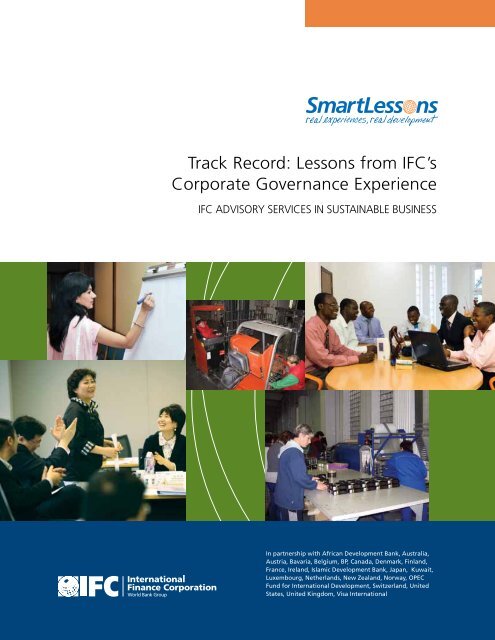
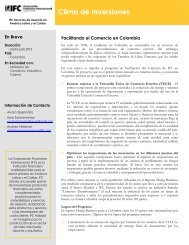
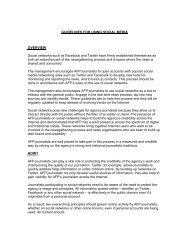
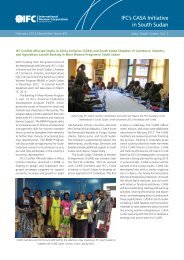
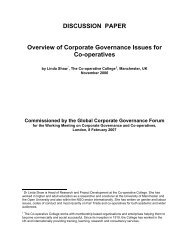
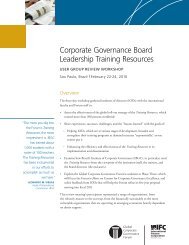
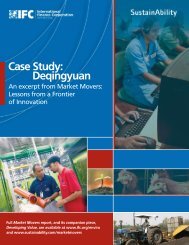
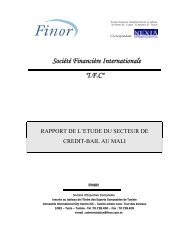
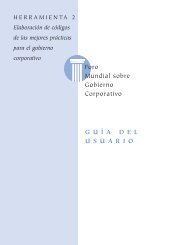
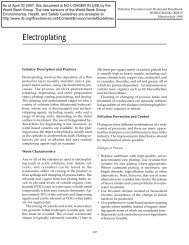
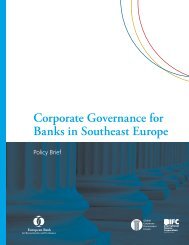
![Print a two-page fact sheet on this project [PDF] - IFC](https://img.yumpu.com/43449799/1/190x245/print-a-two-page-fact-sheet-on-this-project-pdf-ifc.jpg?quality=85)
